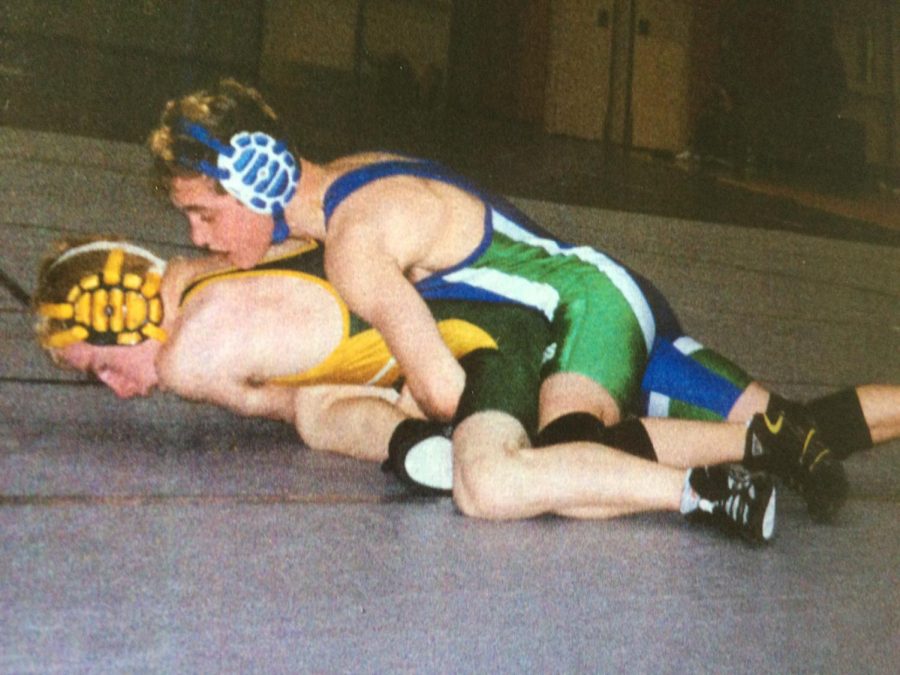WCHS alumni continue their athletic careers
Photo Courtesy of Julie Kraus.
WCHS 2002 alumnus David Kraus pins his opponent during a wrestling meet.
December 17, 2018
For most WCHS athletes, there will be a last shot, dribble, hit, stroke or pass. They will step off the field one last time in high school and move on to a new chapter in their lives. However, a select few get another four years to play, and even fewer get a shot to continue after college.
Each year, WCHS has multiple students who decide to continue their athletic career into college. But what happens while they are there? What happens after they graduate?
WCHS 2002 alumnus David Kraus is one of the few who has never stopped participating in the sport he loves.
“It was always fun for me to be involved in sports, especially wrestling,” Kraus said. “I have not had a season off since I was introduced to the sport during an eighth grade PE unit.”
Participating in sports for well over 20 years takes a strong sense of dedication. Few adults continue organized sports after college, but sometimes a sport can become such an influential part of someone’s life that they never give it up.
“I cannot imagine what type of person I would be without sports,” Kraus said. “Athletics was an outlet for my energy and a way to hang out with friends when I was younger, but through sports I learned to work with a team, set goals, be accountable, be a leader, motivate others, make responsible choices and work extremely hard.”
There is an obvious difference between high school sports and collegiate sports. Many people know that level of intensity and rigor does increase, but there are other, lesser known differences between high school and collegiate athletics.
“The transition from high school to college swimming was difficult in some ways but easy in others,” WCHS 2016 alumna Emily Wang, who is currently swimming at Columbia University, said. “The practices are around the same difficulty, but the duel meets are much more intense. The workload in college is also heavier, and it is difficult juggling school and swimming.”
During his four years at WCHS, Kraus participated in multiple varsity sports. He later narrowed his focus to wrestling, but still enjoyed being able to play with many talented classmates and coaches. After wrestling throughout college, Kraus continued his passion for wrestling by coaching.
“I played soccer and wrestled,” Kraus said. “I always looked up to my coaches a lot, and it is cool to think that I am in the same role they were in all those years ago.”
During Kraus’ career at WCHS, he was able to grow as an athlete and person, always learning a new lesson through competing.
“I think the experience of being an athlete at WCHS taught me to invest in what you are passionate about,” Kraus said. “When you have something you are passionate about, small stresses and challenges cannot affect you the same way.”
Although Kraus was late getting involved in wrestling, he was able to become a crucial part of the varsity team and achieve goals that eventually allowed him to continue his wrestling career at Johns Hopkins University.
“In high school, being a varsity athlete for wrestling my junior and senior years was a big accomplishment,” Kraus said. “I was late getting involved in the sport and there was a big learning curve for me competing against athletes who had wrestled for years. In junior year, I placed third in Montgomery County as a seven seed, and my senior year I was a captain and a state-qualifier. I also got to share the mat with WCHS legends Danny April and Brandon Shapiro, who share five state titles between the two of them and both came back as assistant coaches for WCHS at various times.”
After graduating high school, Kraus found himself still competing in college. Although the competition was at a higher level, Kraus was able to adjust and rise to the challenge.
“In college, I continued growing and made huge strides,” Kraus said. “My sophomore year, I started beating people with significantly better high school accomplishments. During my senior year at Hopkins, I won the conference tournament to qualify for the Division III NCAA national tournament.”
However, moving on to compete in college does not automatically mean an instant improvement.
“I had a rough season last year, so I am looking to improve this year,” Wang said.
In most cases, if an athlete does not play in a professional league, they will stop their sport after college. For Kraus, this was not the case.
“After college, I competed in freestyle tournaments, and was able to compete internationally in the 2009 Maccabiah Games, where I earned a bronze medal at 86 kilograms,” Kraus said. “I am still a competitive person at pretty much everything, and I am grateful that I can still participate in the sport and help younger athletes reach their goals.”
As an adult, Kraus has found multiple ways to stay involved with his passion, and has learned that sharing his passion for others is another love of his.
“At this time, I am the assistant coach at Johns Hopkins and teach middle school Spanish at Catonsville Middle School in Baltimore County,” Kraus said. “Coaching at Johns Hopkins allows me to see young people grow as leaders, individuals and, ultimately, responsible adults. I find inspiration being around people who are working hard for something and enjoying the experience, and I think that is what I look for when I keep coming back as a coach.”


